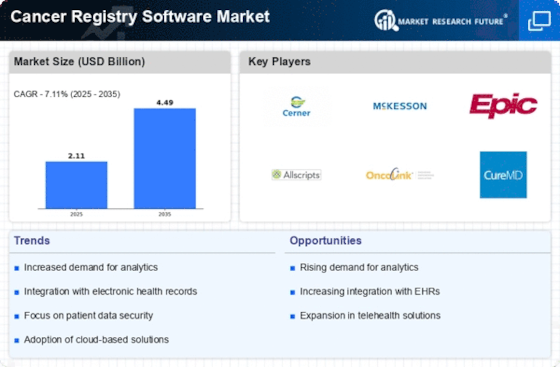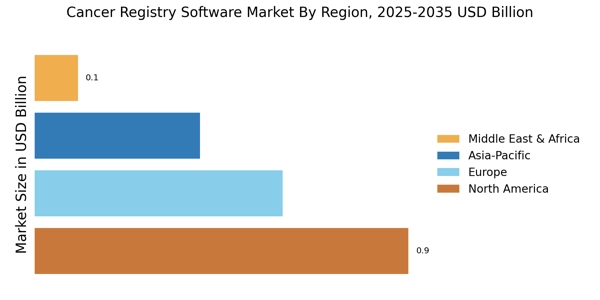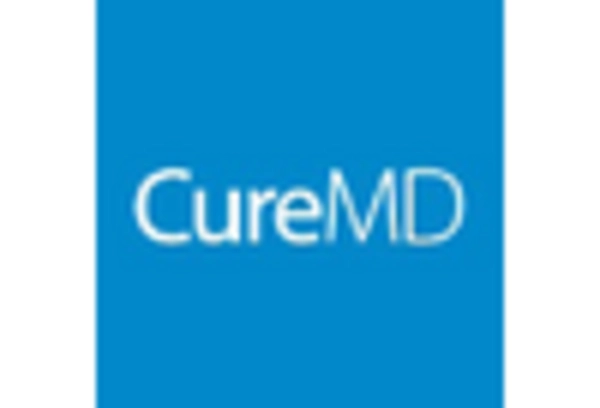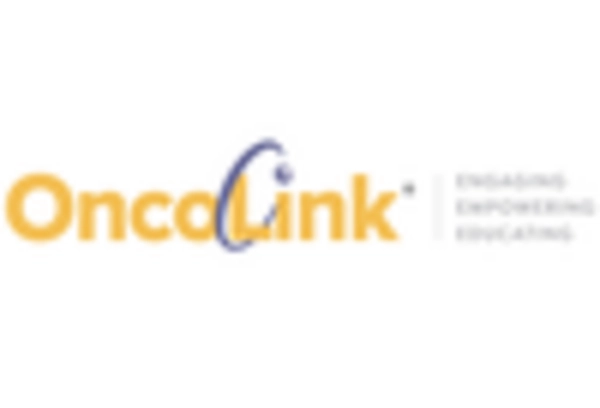Rising Incidence of Cancer Cases
The increasing prevalence of cancer worldwide is a primary driver for the Cancer Registry Software Market. As cancer rates continue to rise, healthcare systems are compelled to enhance their data collection and management capabilities. According to recent statistics, cancer cases are projected to increase by approximately 30% over the next decade. This surge necessitates robust cancer registry systems to track patient data, treatment outcomes, and epidemiological trends. Consequently, healthcare providers and government agencies are investing in advanced cancer registry software to ensure accurate data capture and reporting. This trend not only supports better patient care but also aids in research and policy-making, thereby propelling the growth of the Cancer Registry Software Market.
Government Initiatives and Funding
Government initiatives aimed at improving cancer care and research significantly influence the Cancer Registry Software Market. Various countries have implemented national cancer control programs that emphasize the importance of comprehensive cancer registries. These initiatives often come with substantial funding to develop and maintain cancer registry systems. For instance, funding allocations for cancer research and data management have seen a marked increase, with some regions reporting budget increases of over 20% in recent years. Such financial support encourages healthcare organizations to adopt sophisticated cancer registry software, thereby enhancing data accuracy and accessibility. This trend underscores the critical role of government involvement in shaping the Cancer Registry Software Market.
Growing Focus on Patient-Centric Care
The shift towards patient-centric care is reshaping the Cancer Registry Software Market. Healthcare providers are increasingly prioritizing patient engagement and personalized treatment plans, necessitating comprehensive data collection and analysis. Cancer registries play a crucial role in this paradigm shift by providing essential data on patient demographics, treatment responses, and outcomes. As a result, there is a growing demand for cancer registry software that can facilitate real-time data access and reporting. This focus on patient-centric care not only enhances treatment efficacy but also fosters better communication between patients and healthcare providers. Consequently, the Cancer Registry Software Market is likely to experience growth as organizations seek to implement solutions that align with this evolving healthcare model.
Increased Collaboration Among Stakeholders
The Cancer Registry Software Market is witnessing increased collaboration among various stakeholders, including healthcare providers, researchers, and policymakers. This collaboration is essential for developing comprehensive cancer registries that can effectively track and analyze cancer data. Partnerships between public health organizations and private sector companies are becoming more common, leading to the creation of integrated cancer registry systems. These collaborations often result in shared resources, expertise, and funding, which can enhance the overall effectiveness of cancer registries. As stakeholders recognize the value of collective efforts in combating cancer, the demand for sophisticated cancer registry software is expected to grow. This trend underscores the importance of collaboration in advancing the Cancer Registry Software Market.
Technological Advancements in Data Management
The rapid evolution of technology plays a pivotal role in driving the Cancer Registry Software Market. Innovations such as artificial intelligence, machine learning, and cloud computing are transforming how cancer data is collected, stored, and analyzed. These technologies enable healthcare providers to manage vast amounts of data efficiently, leading to improved patient outcomes and streamlined operations. For example, AI-driven analytics can identify patterns in cancer incidence and treatment efficacy, providing valuable insights for clinicians and researchers. As healthcare organizations increasingly recognize the benefits of these advanced technologies, the demand for cutting-edge cancer registry software is expected to rise. This trend highlights the importance of technological integration in the Cancer Registry Software Market.

















